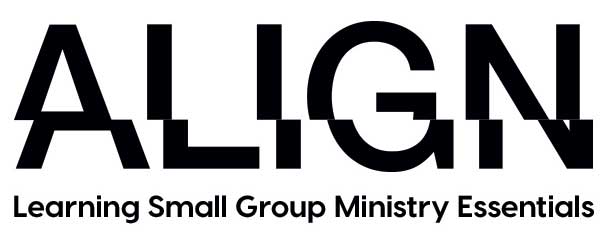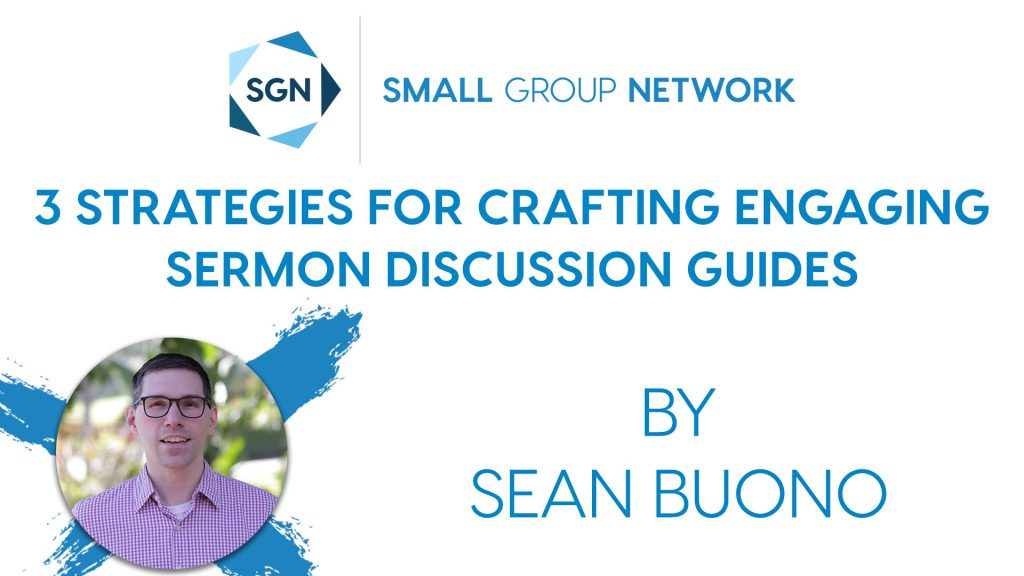
Presenting our new online training course – “Align!” Align will help you learn the small group ministry essentials. It features…
- 8 HD video session taught by Steve Gladen
- A downloadable workbook
- Lesson discussion questions
- An official Small Group Network completion certificate
- A special gift to help further your Small Group Ministry
Learn more by watching the free course introduction & ENROLL HERE!
We’ve all been there: the blank white screen, the copious sermon notes to sift through, and the sudden realization that your church’s small groups are meeting the next day and using the very discussion guide that you haven’t even started to write yet. Whether you are fortunate enough to obtain the sermon notes in advance or whether you prefer to burn the midnight oil and write your sermon discussion guides late into Sunday evenings, we all can agree that writing consistently engaging sermon discussion guides is a tough gig. But we teachers wouldn’t have it any other way, and this coffee-fueled labor of love finds itself reenergized by the stories that are heard from the field when small group leaders occasionally stop us in the church lobby to share a quick testimony of a breakthrough conversation they had last week in their group. It’s moments like these where we become filled with joy and praise God for giving us the amazing opportunity to artfully craft content that stirs the hearts of small group attendees in such a transformational way.
Today, let us explore a few strategies on creating sermon discussion guides that capture the hearts and minds of our churches’ small group attendees on a weekly basis.
Power of Prayer
You probably guessed “Prayer” was on the list, and readers of this article may be tempted to even pass over this section, but please hear me out on this one. There have been countless times when I became anxious and was not sure of what I could possibly write to help glorify God in a sermon discussion guide. However, during each and every single one of those “countless times,” I have called upon the Lord and asked for His wisdom to give me a helping hand; I’m here to share with you that He has faithfully and powerfully shown up every single one of those times. That’s how good God is. When we pray and ask for something that is in alignment with His will and for something that gives Him glory, then He will show up for His name’s sake. If you have been struggling with finding the wisdom that can help you craft your guides, then pray—I mean really…truly give your sermon discussion guide to God and ask for the Holy Spirit to bless you with the ability to seek and find what He has in store for your small group ministry. I promise you that He will deliver.
Context is Key
When I listen to my pastors’ sermons, I try to jot down the verses used and key takeaways that can be utilized as starting points for questions within that week’s guide. One tactic that I use is to bring along my laptop and paraphrase the sermon in real-time. By doing this, I’m then able to go back through my notes and find the key points from which fruitful conversation can be derived from. One of the tactics I use for this is to take a Bible verse that the pastor quoted and then read the surrounding context of that verse within the Scriptures. Oftentimes, pastors don’t have enough time in their sermon to fully explore the underlying background to a verse. However, a small group can be the perfect opportunity to dig in deeper and learn more about God’s word. By recommending your groups to read those nearby verses of Scripture, the questions you create are surrounding the very same material that the pastor had used. As a result, the conversations that explore these topics will have a tendency to enrich and deepen the groups’ understanding of the pastor’s original message even more.
Sermon Discussion, not Sermon Competition
As a teacher, my mind has a tendency to think of new content that can explore the underlying message of the pastor’s sermon that week. Yet the reality I often have to remind myself of is that this doesn’t mean that it would actually be beneficial to include new content in the week’s sermon discussion guide. After all, our group members already spent 30-60 minutes that week listening to the pastor’s sermon. The discussion guide’s purpose is not to go off on a tangent but instead to facilitate engaging conversations that have the ability to hit the ground running. Even if new content could be spiritually relevant to the topic at hand, it actually can have an adverse effect of creating unnecessary pressure on our group leaders, essentially forcing them to preach our sermons for us. Instead, I try to craft questions in a way that edifies the pastor’s content. For example, “Pastor Sam/Sally says (insert spiritual truth here)…How might this look in our lives if we view it through the lens of (insert context/nearby Scripture here)?” Indeed, we must remember that we are not in competition with our pastors, but instead that we are teammates who have the marvelous opportunity to work together and amplify the reach of the good news within our small group communities.





